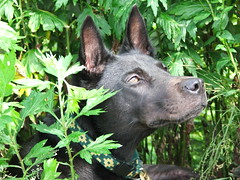Supplements and single herbs for cancer in cats and dogs
 I don’t use a lot of supplements and single herbs in treating cancer.
I don’t use a lot of supplements and single herbs in treating cancer.
Why?
Personally I have found that more complex herbals work better in my hands. I feel like you get more bang from the combination herbals and more synergy between the herbals. I can give 4 herbals and end up with 30-40 herbs working together. See Herbal Treatments – plants holding cancer at bay
If I pick out single supplements and herbals and combine them I loss a lot of the synergy. It is also easy to get overwhelmed with supplements – I’ve had dogs come in on a whole shopping bag of them. As I remove them from the protocol one by one, people will ask me, “what is wrong with that one, isn’t it good?”
Sure its good. It is rare that someone comes in with their dog on something harmful. However we can only give them so many things and I want the things that work the best, that are going to help the most.
So here is my very short list of single supplements and herbals that I use with some of the dogs and cats I work with.
- IP6 – I first was introduced to IP6 by my acupuncture teacher Richard Panzer. He used a lot of it combined with Coenzyme Q10. He got very good results when he combined these with acupuncture and other herbals. I still use a lot of IP6 especially for dogs with hemangiosarcoma. It is very safe and you don’t need to know Chinese medicine to use it.
Inositol Hexaphosphate, also known as IP6 is important in stimulating the immune system’s natural killer cells to destroy cancer tissue. It is an antioxidant and has effects in inhibiting cancer cell growth and division. Not much research has been done in humans with this supplement but a lot of cancer studies have been done in animals.
I dose cats at 400mg two times a day and dogs 800-1600mg twice a day when I use this supplement.
Here are some articles on IP6
- Coenzyme Q10 I often pair with IP6. I use it for any cancer in the heart. I also use it for boxers and breeds prone to heart issues and dogs with active cardiac disease and murmurs. It is a must for any of the chemo drugs like doxorubicin which are know to cause heart damage. CoQ10 has been shown to reduce cardiotoxicity (toxicity to the heart) in people on the chemotherapy drug doxorubicin (adriamycin) in clinical studies.
Coenzyme Q10
is an enzyme made by the body and found in the membranes of many tissues. CoQ10 has effects in stimulating the immune system and works as a strong antioxidant. In animals and people with cancer it has been shown that levels of CoQ10 are lower then in normal individuals. There is some evidence that CoQ10 can increase cancer survival times.
 Reduced levels of CoQ10 have been found in animals and people with heart issues. CoQ10 can help to protect the heart, lower blood pressure and help with repair to the heart.
Reduced levels of CoQ10 have been found in animals and people with heart issues. CoQ10 can help to protect the heart, lower blood pressure and help with repair to the heart.I dose CoEnzyme Q10 at 200mg per day for dogs and 50mg per day for cats.
Here are some additional articles on CoQ10
- Vit A/D – I used to not be a vitamin pusher but I have seen some very good results with using very high doses of Vitamin A and D in animals with cancer, especially hemangiosarcoma. I use an once a week dosage and because the dosage I use can cause kidney damage and failure I always pair this treatment with either Xiao Chai Hu Tang or Chai Hu Jia Long Mu Li Tang. I do not recommend treating with high doses of these vitamins unless you are under the care of a veterinarian with some knowledge of these treatments. I am happy to give the dosage I use out to vets if they want to contact me.
- Fish Oil – if you can add Fish Oil to your animals food I start to consider this food and not supplement. Fish oil has some nice anti-cancer effects and can also help prevent cancer cachexia (weight loss in spite of good appetite). The Omega Fatty Acids in fish oils act as anti-oxidants and help support the immune system and reduce inflammation in the body. I like the Nordic Naturals
brand.
- Medical Mushrooms are amazing in their abilities to help the body fight cancer and stimulate the immune system, the Chinese have been using these for years.
- Mushrooms also help with giving animals added nutrition when they need it, such as when they have cancer or are going through chemo.
The best mushrooms to use for an animal with cancer are maitake, shiitake, reishi, turkey tail and cordyceps. A combination can be used or focus on one.
I recommend at least 300mg of mushrooms be given daily for every 50lb of cat or dog. More in fine.
One of the best ways to dose mushrooms is by adding them to your dog’s food (doesn’t work quite as well in cats). My favorite company for dried mushrooms is Fungusamongus. They have a good price on dried bulk mushrooms. You can also use a mushroom powder such as MUSH Mushroom Blend.

